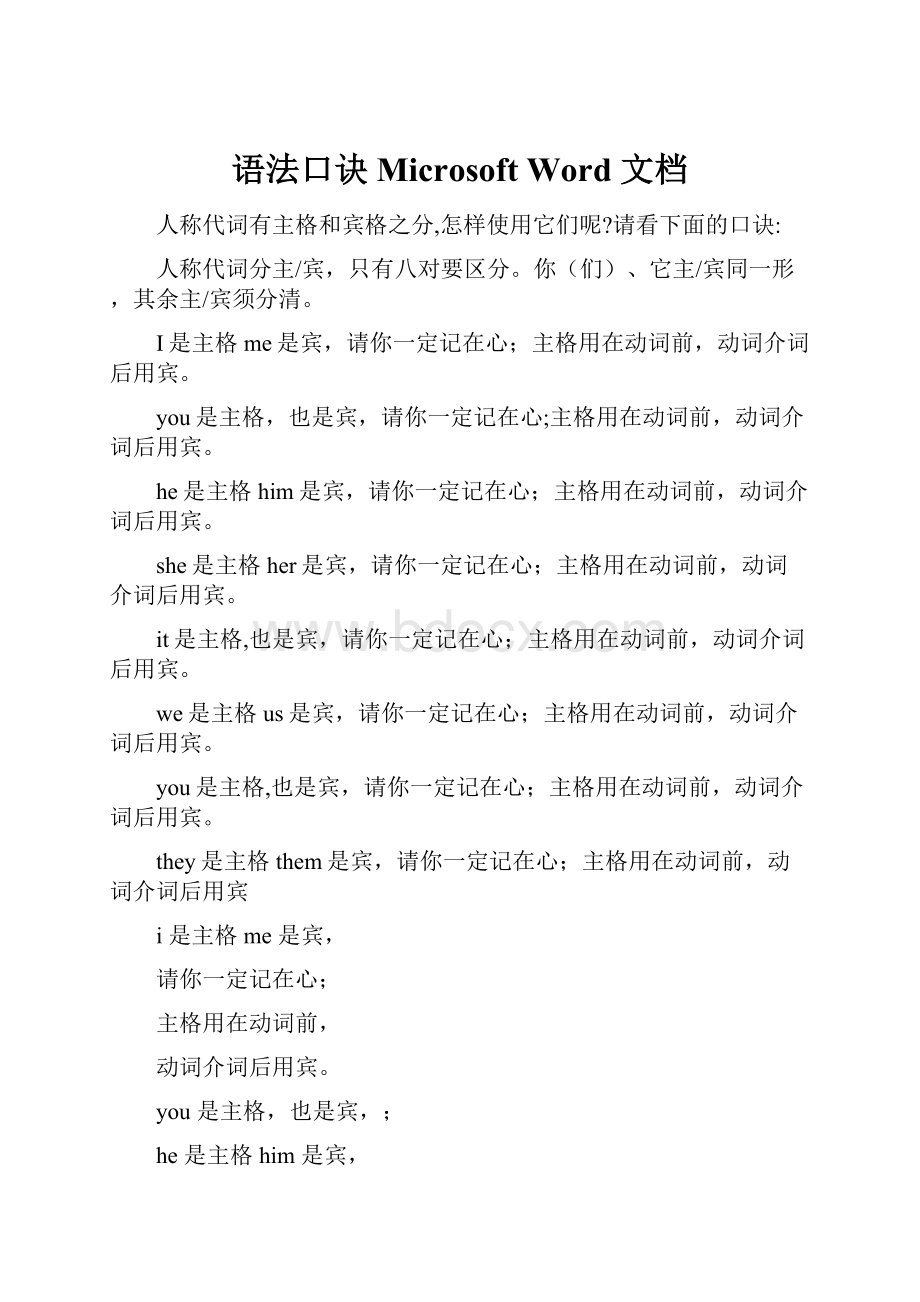语法口诀Microsoft Word 文档.docx
《语法口诀Microsoft Word 文档.docx》由会员分享,可在线阅读,更多相关《语法口诀Microsoft Word 文档.docx(11页珍藏版)》请在冰豆网上搜索。

语法口诀MicrosoftWord文档
人称代词有主格和宾格之分,怎样使用它们呢?
请看下面的口诀:
人称代词分主/宾,只有八对要区分。
你(们)、它主/宾同一形,其余主/宾须分清。
I是主格me是宾,请你一定记在心;主格用在动词前,动词介词后用宾。
you是主格,也是宾,请你一定记在心;主格用在动词前,动词介词后用宾。
he是主格him是宾,请你一定记在心;主格用在动词前,动词介词后用宾。
she是主格her是宾,请你一定记在心;主格用在动词前,动词介词后用宾。
it是主格,也是宾,请你一定记在心;主格用在动词前,动词介词后用宾。
we是主格us是宾,请你一定记在心;主格用在动词前,动词介词后用宾。
you是主格,也是宾,请你一定记在心;主格用在动词前,动词介词后用宾。
they是主格them是宾,请你一定记在心;主格用在动词前,动词介词后用宾
i 是主格 me 是宾,
请你一定记在心;
主格用在动词前,
动词介词后用宾。
you 是主格,也是宾,;
he 是主格 him 是宾,
she 是主格 her 是宾,
it 是主格,也是宾,
we 是主格 us 是宾,
you 是主格,也是宾,
they 是主格 them 是宾。
主格宾格一定要分清。
用例子告诉他。
如Heismyfriend.他是我的朋友。
他就是主格。
主语一般用在开头。
my我的,就是物主代词。
表示xxx的。
Letmesee.让我瞧瞧。
besideme在我旁边,动词介词后面接宾格。
1、 现在进行时:
动作正进行,要用进行时。
主语在句首,am is are 跟在后,
现在分词跟着走,其他成分不可丢。
一般问句这样变,把be提到句前去,
否定句式也简单,be后只把not加。
2、 一般现在时:
现在经常做的事,要用一般现在时。
第三人称作主语,动词后面加s/es。
其它人称作主语,动词只需用原形。
3、 一般将来时
不久将要发生事,记住要用将来时。
Be加going to,后面跟着动原形。
Be的形式要记住,随着主语随时变。
还有一种表达法,will后要加动原形。
4、 一般过去时
事情已发生,要用一般过去时
主语在句首,后面跟着动词过去式。
动词过去式,变化有规律,
还有特殊变化要牢记。
小学英语四种时态总结
1. 一般现在时。
主要描述经常会发生的动作、状态或不变的真理。
句末常出现everyday/week/year/Monday,inthemorning,句中常有always,usually,often,sometimes
组成:
主语+be+名词(形容词)
Iamastudent. Heistall.
否定句:
在be后加not
Iamnotastudent. Heisnottall.
疑问句:
be动词提前到第一位。
Areyouastudent?
Ishetall?
Yes,Iam./No,Iamnot.Yes,heis./No,heisn’t.
主语+动词+地点+时间
WegotoschoolonMonday.
HegoestotheparkonSunday.
否定句:
主语+don’t/doesn’t’t+动词原形+地点+时间
Wedon’tgotoschoolonMonday.
Hedoesn’t’tgototheparkonSunday.
疑问句:
在句首加do或does
DoyougotoschoolonMonday?
Yes,wedo./No,wedon’t.
DoeshegototheparkonSunday?
Yes,hedoes./No,hedoesn’t’t.
动词单三变化:
1.在原单词末尾加s,如:
like–likes
2.单词以o,sh,ch,s,x结尾加es,如:
go–goes
3.单词末尾为辅音+y结尾去y加ies如:
study-studies
2.现在进行时:
主要叙述正在发生的事情。
句末常出现now,句首常出现look,listen
组成:
主语+be+动词ing形式
IamreadingEnglish.
Theyareswimming.
Heisplayingfootball.
否定句:
在be后加not
IamnotreadingEnglish.
Theyarenotswimming.
Heisnotplayingfootball.
疑问句:
将be放到第一位。
AreyoureadingEnglish?
Yes,Iam./No,Iamnot.
Aretheyswimming?
Yes,theyare./No,theyaren’t.
Isheplayingfootball?
Yes,heis./No,heisn’t.
动词变ing形式:
1.在动词末尾加ing.如:
play-playing
2.末尾有e要去e加ing.如:
ride–riding
3.末尾以辅音元音辅音结尾双写末尾一个辅音如:
swim-swimming
3.一般将来时。
主要描述将来要发生的事情。
句末常出现nextMonday/week/year,tomorrow
组成:
主语+begoingto+动词原形
IamgoingtovisitAnn.
Theyaregoingtodrawadog.
Sheisgoingtorideahorse.
否定句:
在be后加not
IamnotgoingtovisitAnn.
Theyarenotgoingtodrawadog.
Sheisgoingtorideahorse.
疑问句:
将be提前
AreyougoingtovisitAnn?
Yes,Iam./No,Iamnot.
Aretheygoingtodrawadog?
Yes,theyare./No,theyaren’t.
Isshegoingtorideahorse?
Yes,sheis./No,sheisn’t.
组成:
主语+will+动词原形
Iwillgotothelibrary.
Theywillcleanthehouse.
Shewilleatbreakfastathome.
否定句:
在will后加not或将willnot写为won’t
Iwillnotgotothelibrary.
Theywillnotcleanthehouse.
Shewillmoteatbreakfastathome.
疑问句:
将will提前
Willyougotothelibrary?
Yes,Iwill./No,Iwon’t.
Willtheycleanthehouse?
Yes,theywill./No,theywon’t.
Willsheeatbreakfastathome?
Yes,shewill./No,shewon’t.
4.一般过去时:
主要描述过去发生的事情.句末常出现lastnight/week/Monday/year,yesterday,ago
组成:
主语+动词过去式
Iwasapilot.
Theywerebusy.
Hewenttothemarket.
否定句:
在be后加not
在普通动词前加didn’t动词恢复原形。
Iwasnotapilot.
Theywerenotbusy.
Hedidn’tgotothemarket.
疑问句:
提前be动词或在句前加did
Wereyouapilot?
Yes,Iwas./No,Iwasn’t.
Weretheybusy?
Yes,theywere./No,theyweren’t.
Didtheygotothemarket?
Yes,theydid./No,theydidn’t.
动词变过去式:
1.在原次末尾加ed或d 如:
play-played
like-liked
2.辅音加y结尾去y加ied如:
study-studied
3.辅音元音辅音结尾双写最后一个字母加ed如:
stop-stopped
特殊变化:
can-could do-did eat-ate go-went
hit-hit pit-put sit-sat come-came
get-got have-had see-saw begin-began
give-gave win-won read-read
am/is-was are-were run-ran hear-heard
hide-hid lay-laid cut=cut wake-woke fall-fell
连系动词be是am,is,are三者的原形,一般不直接出现在句子中,而是以am,is,are的形式出现。
它们各有分工,而且随着主语的人称和数的变化而变化。
am最专一,始终跟着I转;are跟you,we及表复数名词或复数意义的词连用;is的交际最广泛,is与“他、她、它”形影不离,至于名词单数,指示代词(this/that)都与is结下不解之缘。
一、 一般现在时
1.定义:
表示经常或习惯发生的动作或存在的状态,通常与时间状语usually、often、always、sometimes、everyday、onceaweek连用。
例如:
She often reads newspapers aftert supper。
她经常在晚饭后看报。
2.一般现在时还可以表示客观事实或普遍真理。
例如:
The earth moves round the sun。
地球围绕太阳转。
3.主语为第三人称(他、她、它、人名)单数时,其后动词也要变成相应形式即复数形式。
例如:
Mike everyday goes to school.
4.含be动词/含实义动词的基本句型:
a肯定句:
主语+be动词的一般现在时(am/is/are)+… 例如:
He is a boy.
/主语+动词的一般现在时+…,例如:
He usually goes to school。
b一般疑问句:
Be+主语+…例Is he a boy?
肯答Yes,heis;否定答:
No,he isn’t
Do/Does+主语+动词原形+…
例Doeshegotoschoolusually?
Yeshedoes/Nohedoes’nt
c特殊疑问句:
特殊疑问词+be+主语+动词原形。
例what is his name?
特殊疑问词+do/does+主语+动词原形。
whydoeshegoto schoolusually?
二、 现在进行时
1. 定义:
表示现在正在进行的动作或行为。
2. 现阶段两种用法:
第一、表示此时此刻正在进行的动作。
例如Is it snowing now?
现在在下雪吗?
第二、表示现阶段正在进行的动作,但说话时动作不一定正在进行。
例如:
He is translating a book. 他正在翻译一本书。
3.基本句型:
a肯定句:
主语+be(am/is/are)+动词现在分词+…
例Sheis readinga book。
b一般疑问句:
Be+主语+动词现在分词+…?
例:
Is shereading a book?
肯定回答:
Yes,sheis。
否定回答:
No,she isn’t
c特殊疑问句:
特殊疑问词+be+主语+动词现在分词+…
例who is reading a book?
三、 一般过去式
1.定义:
表示过去发生的动作或存在的状态。
一般过去式没有人称和数的变化,句中的动词一律用过去式。
2、be动词/行为动词一般过去式的基本句型:
a肯定句:
主语+be(was/were)+…例He was busy yesterday。
他昨天很忙
/主语+动词的过去式+… 例He played tennis last week。
他上周打网球了。
b否定句:
主语+be(was/were)+not+…例如He was not busy yesterday。
/主语+didnot+动词原形+… 例He did not playtennis last week。
c一般疑问句:
Was/Were+主语+…例如:
Was he busy yesterday?
肯定回答:
Yes,hewas;否定回答:
No,he wasn’t
/Did+主语+动词原形+…?
例如 :
Did he play tennis last week。
肯定回答:
Yes ,he did。
否定回答:
No, he didn’t
d特殊疑问句:
特殊疑问词+was/were+主语+…?
例:
why were you busy yesterday?
特殊疑问词+did+主语+动词原形+…?
whendidheplaytennislastweek?
四一般将来时:
1.定义:
表示将来某个时间要发生的动作或存在的状态,常与表示将来的时间状语连用。
2.begoingto+动词原形,表示说话者明确的打算或确信会发生的事。
a 肯定句:
主语+be(am/is/are)going to+动词原形+其他。
例如:
He is going to play football tomorrow。
b否定句:
主语+be(am/is/are)not going to+动词原形+其他。
例如:
He is not going to play football tomorrow。
c一般疑问句:
be(am/is/are)+主语+going to+动词原形+其他?
例如:
Is he going to play football tomorrow?
Yes,heis/No,he isn’t
d特殊疑问句:
特殊疑问词+be(am/is/are)+主语+going to+动词原形+其他?
例如:
What are you going to play football tomorrow?
3.Will/Shall+动词原形,表示将要发生的动作或行为。
(Will任意人称/shall只能第一人称)
a 肯定句:
主语+will/shall+动词原形+其他。
例如:
I will call you tonight 。
我今晚会给你打电话。
b否定句:
主语+will/shallnot+动词原形+其他。
例如:
I will not call you tonight。
c一般疑问句:
Will/Shall+主语+动词原形+其他?
例如:
Will you go to the zoo tomorrow?
Yes,Iwill; No,I won’t
d特殊疑问句:
特殊疑问词+will/shall+主语+动词原形+其他?
例如:
When will you leaveChina?
4、解析区别:
1、Begoingto+动词原形:
表示一个事先考虑好的的意图,相当于中文的打算、计划、准备;
2、Will/Shall+动词原形:
表示未经事先考虑的意图.
5、一般将来时的时间状语:
soon很快、intwoweeks两周后、some day将来的某一天、nextyear明年thedayaftertomorrow后天、inthefuture在未来、nextsummer 明年夏天
D. is;swimming;isswimming
16._____you_____tomusicnow?
Yes,we_____.
A.Do;listen;do B.Did;listen;did C.Are;listening;are
17.Putonyoucoat,please.OK.I______iton.
A.amputting B.amgoingtoput C.put
18._____you______coffee?
Yes,I______.
A.Do;like;do B.Did;like;did C.Are;like;am
19.Look!
Twocats______acrossthewall.
A.run B.runs C.arerunning
20.She_____tea,buthe_____.
A.likes;doesn’t B;like;don’t C.likedoesn’t